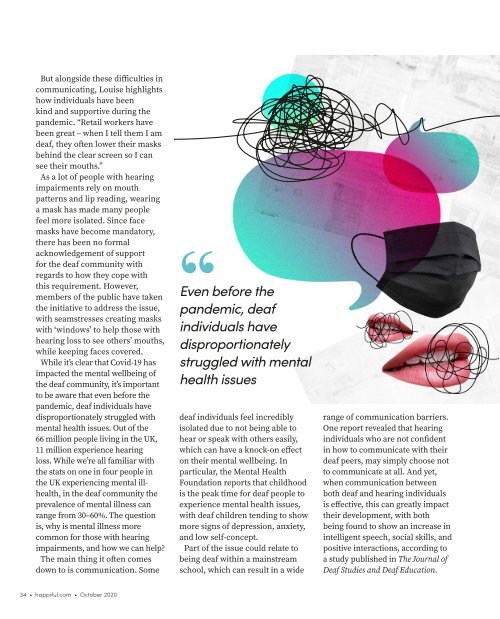You also want an ePaper? Increase the reach of your titles
YUMPU automatically turns print PDFs into web optimized ePapers that Google loves.
But alongside these difficulties in<br />
communicating, Louise highlights<br />
how individuals have been<br />
kind and supportive during the<br />
pandemic. “Retail workers have<br />
been great – when I tell them I am<br />
deaf, they often lower their masks<br />
behind the clear screen so I can<br />
see their mouths.”<br />
As a lot of people with hearing<br />
impairments rely on mouth<br />
patterns and lip reading, wearing<br />
a mask has made many people<br />
feel more isolated. Since face<br />
masks have become mandatory,<br />
there has been no formal<br />
acknowledgement of support<br />
for the deaf community with<br />
regards to how they cope with<br />
this requirement. However,<br />
members of the public have taken<br />
the initiative to address the issue,<br />
with seamstresses creating masks<br />
with ‘windows’ to help those with<br />
hearing loss to see others’ mouths,<br />
while keeping faces covered.<br />
While it’s clear that Covid-19 has<br />
impacted the mental wellbeing of<br />
the deaf community, it’s important<br />
to be aware that even before the<br />
pandemic, deaf individuals have<br />
disproportionately struggled with<br />
mental health issues. Out of the<br />
66 million people living in the UK,<br />
11 million experience hearing<br />
loss. While we’re all familiar with<br />
the stats on one in four people in<br />
the UK experiencing mental illhealth,<br />
in the deaf community the<br />
prevalence of mental illness can<br />
range from 30–60%. The question<br />
is, why is mental illness more<br />
common for those with hearing<br />
impairments, and how we can help?<br />
The main thing it often comes<br />
down to is communication. Some<br />
Even before the<br />
pandemic, deaf<br />
individuals have<br />
disproportionately<br />
struggled with mental<br />
health issues<br />
deaf individuals feel incredibly<br />
isolated due to not being able to<br />
hear or speak with others easily,<br />
which can have a knock-on effect<br />
on their mental wellbeing. In<br />
particular, the Mental Health<br />
Foundation reports that childhood<br />
is the peak time for deaf people to<br />
experience mental health issues,<br />
with deaf children tending to show<br />
more signs of depression, anxiety,<br />
and low self-concept.<br />
Part of the issue could relate to<br />
being deaf within a mainstream<br />
school, which can result in a wide<br />
range of communication barriers.<br />
One report revealed that hearing<br />
individuals who are not confident<br />
in how to communicate with their<br />
deaf peers, may simply choose not<br />
to communicate at all. And yet,<br />
when communication between<br />
both deaf and hearing individuals<br />
is effective, this can greatly impact<br />
their development, with both<br />
being found to show an increase in<br />
intelligent speech, social skills, and<br />
positive interactions, according to<br />
a study published in The Journal of<br />
Deaf Studies and Deaf Education.<br />
34 • happiful.com • <strong>October</strong> <strong>2020</strong>

















